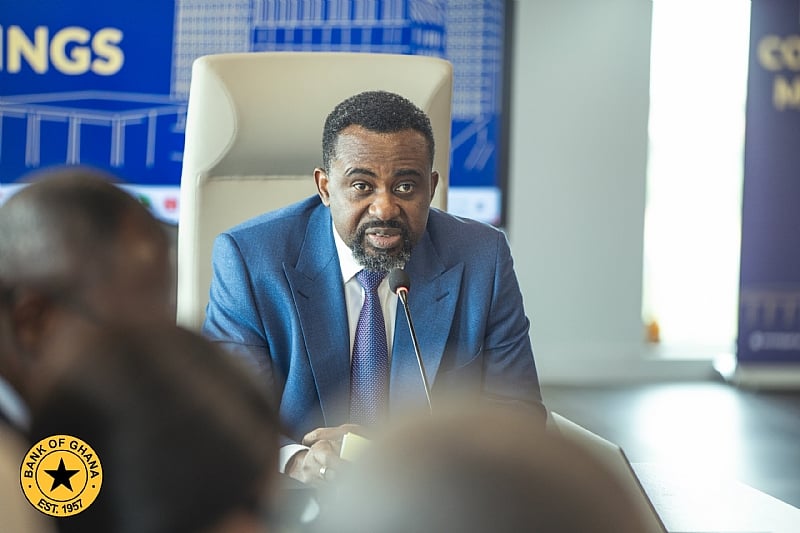The Bank of Ghana (BoG) has decided to maintain its monetary policy rate at 28%, signaling a cautious stance against potential inflationary pressures despite recent improvements in macroeconomic indicators. This decision, announced following the Monetary Policy Committee (MPC) meeting on May 23, 2025, underscores the BoG’s prioritization of price stability over stimulating economic activity through lower interest rates. While acknowledging the gains made in currency stabilization and overall economic performance, the central bank expressed concerns about the possible resurgence of inflation later in the year, justifying the need for a sustained tight monetary policy. This cautious approach reflects the BoG’s commitment to anchoring inflation expectations and ensuring the long-term health of the Ghanaian economy, even at the potential cost of short-term growth spurred by lower borrowing costs.
The decision to hold the policy rate steady comes despite growing pressure from the private sector and financial institutions for a rate cut to encourage lending and investment. These stakeholders argue that lower interest rates would stimulate economic activity, boost private sector growth, and contribute to job creation. They point to the recent improvements in the macroeconomic environment, including currency stabilization and positive growth trends, as evidence that the economy can handle a slight easing of monetary conditions. However, the BoG remains unconvinced, emphasizing the fragility of the current economic recovery and the potential for external shocks or internal factors to reignite inflationary pressures. The central bank’s stance underscores the delicate balancing act it faces between supporting economic growth and maintaining price stability.
Governor Dr. Johnson Asiama, in his address to the media, highlighted the rationale behind the decision. He emphasized the importance of managing inflation expectations, stating that a premature easing of monetary policy could send the wrong signal to the market and potentially undermine the progress made in stabilizing prices. Dr. Asiama acknowledged the concerns of the private sector but stressed that the BoG’s primary mandate is to maintain price stability, which is a crucial prerequisite for sustainable economic growth. He underlined the central bank’s commitment to closely monitoring economic indicators and adjusting its policy stance as necessary to ensure the long-term health and stability of the Ghanaian economy. The Governor’s remarks reflect the BoG’s determination to prioritize long-term stability over short-term gains.
The BoG’s cautious approach to monetary policy is rooted in the understanding that inflation, once unchecked, can erode purchasing power, destabilize the economy, and disproportionately impact vulnerable populations. The central bank recognizes that achieving sustainable economic growth requires a stable macroeconomic environment, which includes low and stable inflation. While acknowledging the potential benefits of lower interest rates for stimulating economic activity, the BoG remains concerned about the potential risks of premature easing. These risks include a resurgence of inflation, further currency depreciation, and a potential reversal of the positive economic gains achieved so far. Therefore, the central bank has chosen to err on the side of caution, prioritizing price stability over short-term growth stimulation.
The decision to maintain the policy rate at 28% reflects the BoG’s assessment of the current economic landscape and its outlook for the remainder of the year. While the central bank acknowledges the positive developments in the economy, it emphasizes the need for continued vigilance and a cautious approach to policy adjustments. The BoG anticipates potential inflationary pressures later in the year, driven by both internal and external factors. Internally, potential increases in government spending and rising demand could put upward pressure on prices. Externally, global commodity price fluctuations and potential disruptions in supply chains pose additional risks. By maintaining a tight monetary policy stance, the BoG aims to mitigate these risks and ensure that inflation remains within its target range.
The BoG’s decision to hold the policy rate steady is a strategic move aimed at consolidating the gains achieved in macroeconomic stabilization and anchoring inflation expectations. While the private sector may be disappointed by the lack of a rate cut, the central bank’s focus on long-term stability is crucial for creating a conducive environment for sustainable economic growth. The BoG has signaled its commitment to closely monitoring economic developments and adjusting its policy stance as necessary to achieve its mandate of price stability and support the overall health of the Ghanaian economy. This cautious approach underscores the importance of balancing short-term growth aspirations with the need for long-term macroeconomic stability, a strategy that the BoG believes will ultimately benefit all stakeholders in the Ghanaian economy.


